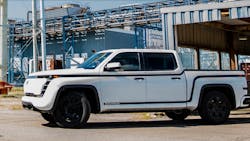Lordstown pushes back Endurance deliveries timeline
Lordstown Motors Corp. executives have pushed back the timeline for the start of commercial production of their Endurance all-electric pickup truck and will hold off on providing guidance for 2022 until they’ve completed the sale of their plant to Foxconn and have worked through the financial implications of that deal.
Lordstown leaders said they have experienced “a modest delay” in making pre-production vehicles to be tested and that they now expect to begin delivering Endurances during the third quarter of next year, about three months later than previously planned. The Lordstown team this week finalized a purchase agreement with Foxconn parent company Hon Hai Technology Group to have the latter pay $230 million for the Lordstown, Ohio, facility and enter into a contract manufacturing deal with Lordstown. Foxconn plans to use parts of the 6.2 million-square-foot plant not needed by Lordstown for other manufacturing work, including for Fisker.
Investors greeted Lordstown’s news, which was presented alongside third-quarter results that showed a $95.8 million net loss, by pushing down the company’s shares Nov. 12 after they had popped more than 20% the day before on word of the Foxconn deal taking its next step. In late-morning trading, the stock (Ticker: RIDE) was down 14% to $5.91. (Investors earlier this week reacted similarly to word from fellow EV maker Arrival that it also is pushing back some production schedules.)
“We know we have to get that truck out. [It’s] been a challenging quarter with raw material shortages, part shortages, supply chain disruptions, particularly from international sourcing, but we're doing everything we can to mitigate it,” Lordstown CEO Daniel Ninivaggi told analysts and investors on a Nov. 11 conference call. “And you have our commitment that we're going to do everything possible to get the truck out on our revised schedule.”
Ninivaggi reiterated his optimism about the commercial EV market—Lordstown is especially focused on selling to fleets—and said interest is growing from local, state, and the federal government. Production plans from both established manufacturers such as General Motors and newcomers such as Lordstown, he said, look likely to fall short of demand.
“That's where we see the opportunity,” Ninivaggi said. “And I think that's going to be the case for the next several years.”
Lordstown also replaced its president in an executive board shake-up earlier this week.
About the Author
Geert De Lombaerde
Senior Editor
A native of Belgium, Geert De Lombaerde has more than two decades of experience in business journalism. Since 2021, he has written about markets and economic trends for Endeavor Business Media publications FleetOwner, Healthcare Innovation, IndustryWeek, Oil & Gas Journal, and T&D World.
With a degree in journalism from the University of Missouri, he began his reporting career at the Business Courier in Cincinnati. He later was managing editor and editor of the Nashville Business Journal. Most recently, he oversaw the online and print products of the Nashville Post and reported primarily on Middle Tennessee’s finance sector and many of its publicly traded companies.

